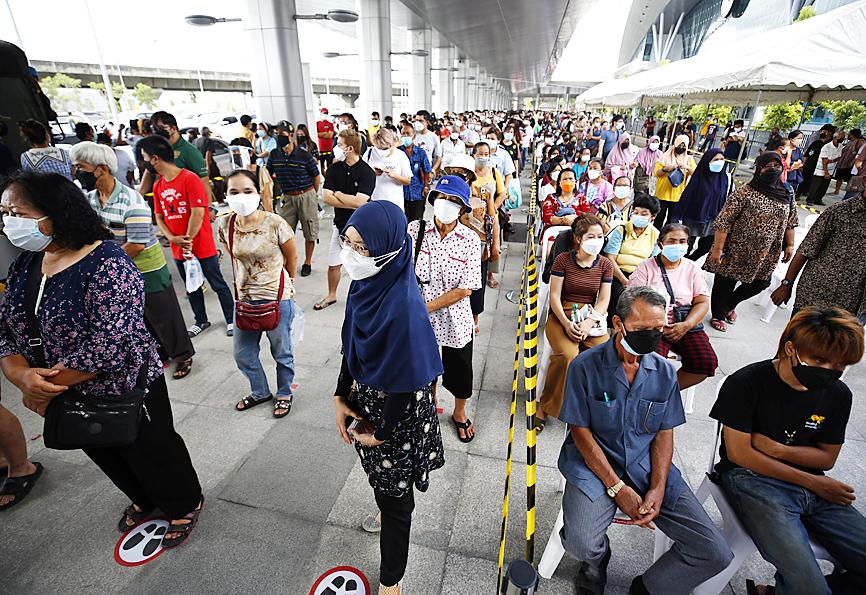Thailand has begun using sleeper trains to transport COVID-19 cases out of Bangkok, where hospitals have been overwhelmed by a surge in numbers.
The first train left the capital on Tuesday, transporting 137 cases who were asymptomatic or had mild symptoms to their hometowns in the northeast of the country.
Thailand is facing its third and most severe wave of the virus since the start of the COVID-19 pandemic, driven by the Delta variant of SARS-CoV-2, which has spread widely across the capital. Hospitals have been forced to treat cases in vehicle parking areas and to turn away people who are severely ill.

Photo: EPA-EFE
Since April, the country’s total fatalities have grown from fewer than 100 to 4,397.
Yesterday, 16,533 cases and 133 deaths were reported.
Thai Minister of Public Health Anutin Charnvirakul on Tuesday said the service would move cases who were unable to access treatment in Bangkok.
“The process is all secured, because they will be closely monitored by doctors and staff and won’t stop anywhere. There will be an emergency team and ambulance standby at the destination,” he said.
Buses, vans and planes might also be used to move people across the country, he said.
A further 15 carriages would be used to isolate cases who are awaiting hospital beds in Bangkok.
A doctor from the group Mor Mai Thon (Doctors Won’t Tolerate It), which has criticized the government response, described the situation in Bangkok as critical.
“It has reached the point where people cannot access medical care at all, which has never happened before. There are a huge number of people who can’t get treated,” said the doctor, who asked to remain anonymous.
Moving people with mild symptoms could help Bangkok in the short term, the doctor said.
However, they said that if such cases developed more severe symptoms, it could overwhelm hospitals in other areas of the country, where there are fewer intensive care beds.
“The Delta variant is very strong, 50 percent of the patients develop a severe condition,” they said.
The government should focus on expanding testing capacity, the doctor said, while medicines need to be given more quickly to cases to prevent their illness from deteriorating.
About 70,000 tests are performed each day, with 20.5 percent returning positive. Demand for testing is so high that long lines stretch outside hospitals where swabs are conducted.
Thailand managed to escape the worst of the virus last year, when it introduced strict lockdown measures, and rolled out test and trace systems. Critics have accused the government of complacency since then, especially in relation to the country’s vaccination campaign, which has suffered from delays and shortages.
About 5 percent of the Thai population is fully vaccinated, while 12.4 percent have received one dose, according to Our World in Data.
Mor Mai Thon is calling for greater transparency around the government’s vaccine contracts and for officials to focus on procuring a greater variety of doses.
Thailand is relying on AstraZeneca and Sinovac. However, studies have found that Sinovac’s efficacy falls 40 days after the second dose. Growing numbers of Thai medics — who were given this vaccine earlier in the year — have become infected.

The death of a former head of China’s one-child policy has been met not by tributes, but by castigation of the abandoned policy on social media this week. State media praised Peng Peiyun (彭珮雲), former head of China’s National Family Planning Commission from 1988 to 1998, as “an outstanding leader” in her work related to women and children. The reaction on Chinese social media to Peng’s death in Beijing on Sunday, just shy of her 96th birthday, was less positive. “Those children who were lost, naked, are waiting for you over there” in the afterlife, one person posted on China’s Sina Weibo platform. China’s

‘POLITICAL LOYALTY’: The move breaks with decades of precedent among US administrations, which have tended to leave career ambassadors in their posts US President Donald Trump’s administration has ordered dozens of US ambassadors to step down, people familiar with the matter said, a precedent-breaking recall that would leave embassies abroad without US Senate-confirmed leadership. The envoys, career diplomats who were almost all named to their jobs under former US president Joe Biden, were told over the phone in the past few days they needed to depart in the next few weeks, the people said. They would not be fired, but finding new roles would be a challenge given that many are far along in their careers and opportunities for senior diplomats can

‘NO COUNTRY BUMPKIN’: The judge rejected arguments that former prime minister Najib Razak was an unwitting victim, saying Najib took steps to protect his position Imprisoned former Malaysian prime minister Najib Razak was yesterday convicted, following a corruption trial tied to multibillion-dollar looting of the 1Malaysia Development Berhad (1MDB) state investment fund. The nation’s high court found Najib, 72, guilty on four counts of abuse of power and 21 charges of money laundering related to more than US$700 million channeled into his personal bank accounts from the 1MDB fund. Najib denied any wrongdoing, and maintained the funds were a political donation from Saudi Arabia and that he had been misled by rogue financiers led by businessman Low Taek Jho. Low, thought to be the scandal’s mastermind, remains

Australian Prime Minister Anthony Albanese yesterday announced plans for a national bravery award to recognize civilians and first responders who confronted “the worst of evil” during an anti-Semitic terror attack that left 15 dead and has cast a heavy shadow over the nation’s holiday season. Albanese said he plans to establish a special honors system for those who placed themselves in harm’s way to help during the attack on a beachside Hanukkah celebration, like Ahmed al-Ahmed, a Syrian-Australian Muslim who disarmed one of the assailants before being wounded himself. Sajid Akram, who was killed by police during the Dec. 14 attack, and